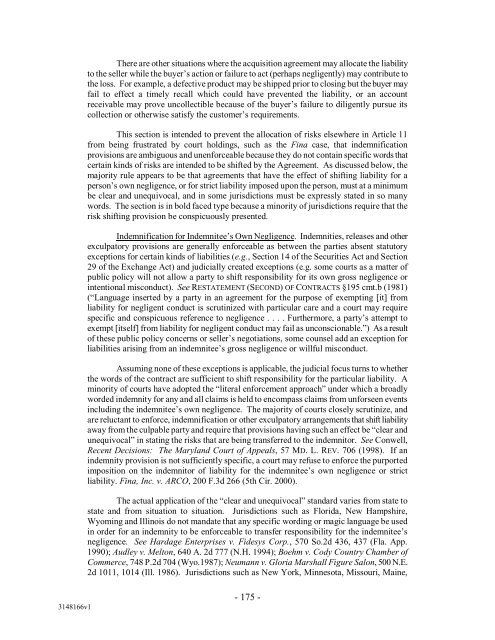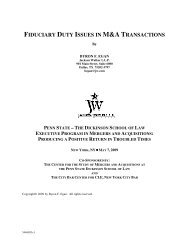asset acquisitions - Jackson Walker LLP
asset acquisitions - Jackson Walker LLP
asset acquisitions - Jackson Walker LLP
You also want an ePaper? Increase the reach of your titles
YUMPU automatically turns print PDFs into web optimized ePapers that Google loves.
There are other situations where the acquisition agreement may allocate the liabilityto the seller while the buyer’s action or failure to act (perhaps negligently) may contribute tothe loss. For example, a defective product may be shipped prior to closing but the buyer mayfail to effect a timely recall which could have prevented the liability, or an accountreceivable may prove uncollectible because of the buyer’s failure to diligently pursue itscollection or otherwise satisfy the customer’s requirements.This section is intended to prevent the allocation of risks elsewhere in Article 11from being frustrated by court holdings, such as the Fina case, that indemnificationprovisions are ambiguous and unenforceable because they do not contain specific words thatcertain kinds of risks are intended to be shifted by the Agreement. As discussed below, themajority rule appears to be that agreements that have the effect of shifting liability for aperson’s own negligence, or for strict liability imposed upon the person, must at a minimumbe clear and unequivocal, and in some jurisdictions must be expressly stated in so manywords. The section is in bold faced type because a minority of jurisdictions require that therisk shifting provision be conspicuously presented.Indemnification for Indemnitee’s Own Negligence. Indemnities, releases and otherexculpatory provisions are generally enforceable as between the parties absent statutoryexceptions for certain kinds of liabilities (e.g., Section 14 of the Securities Act and Section29 of the Exchange Act) and judicially created exceptions (e.g. some courts as a matter ofpublic policy will not allow a party to shift responsibility for its own gross negligence orintentional misconduct). See RESTATEMENT (SECOND) OF CONTRACTS §195 cmt.b (1981)(“Language inserted by a party in an agreement for the purpose of exempting [it] fromliability for negligent conduct is scrutinized with particular care and a court may requirespecific and conspicuous reference to negligence . . . . Furthermore, a party’s attempt toexempt [itself] from liability for negligent conduct may fail as unconscionable.”) As a resultof these public policy concerns or seller’s negotiations, some counsel add an exception forliabilities arising from an indemnitee’s gross negligence or willful misconduct.Assuming none of these exceptions is applicable, the judicial focus turns to whetherthe words of the contract are sufficient to shift responsibility for the particular liability. Aminority of courts have adopted the “literal enforcement approach” under which a broadlyworded indemnity for any and all claims is held to encompass claims from unforseen eventsincluding the indemnitee’s own negligence. The majority of courts closely scrutinize, andare reluctant to enforce, indemnification or other exculpatory arrangements that shift liabilityaway from the culpable party and require that provisions having such an effect be “clear andunequivocal” in stating the risks that are being transferred to the indemnitor. See Conwell,Recent Decisions: The Maryland Court of Appeals, 57 MD. L. REV. 706 (1998). If anindemnity provision is not sufficiently specific, a court may refuse to enforce the purportedimposition on the indemnitor of liability for the indemnitee’s own negligence or strictliability. Fina, Inc. v. ARCO, 200 F.3d 266 (5th Cir. 2000).The actual application of the “clear and unequivocal” standard varies from state tostate and from situation to situation. Jurisdictions such as Florida, New Hampshire,Wyoming and Illinois do not mandate that any specific wording or magic language be usedin order for an indemnity to be enforceable to transfer responsibility for the indemnitee’snegligence. See Hardage Enterprises v. Fidesys Corp., 570 So.2d 436, 437 (Fla. App.1990); Audley v. Melton, 640 A. 2d 777 (N.H. 1994); Boehm v. Cody Country Chamber ofCommerce, 748 P.2d 704 (Wyo.1987); Neumann v. Gloria Marshall Figure Salon, 500 N.E.2d 1011, 1014 (Ill. 1986). Jurisdictions such as New York, Minnesota, Missouri, Maine,3148166v1- 175 -
















